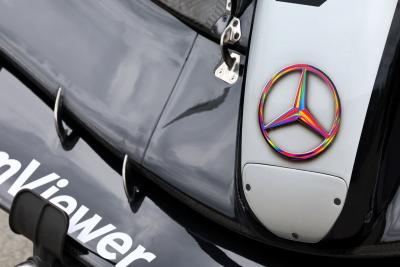Revealed: The upgrades Red Bull and Mercedes have brought to F1 Canadian GP
These are the upgrades every F1 team will bring to the Canadian Grand Prix.
Red Bull
Rear wing. Performance - Local load. Re-profiled rear wing flap across the span. Optimising the flap geometry in an interaction from the previous design to extract locally more load whilst maintaining adequate flow stability for all the conditions encountered.
Front corner. Reliability. a larger front brake cooling exit duct. The brake energy for the Montreal circuit is high enough to necessitate an enlarged exit duct from the front wheel bodywork, moving both inboard and upwards.
Mercedes
Front Suspension. Performance - Flow Conditioning. Realignment of track rod and lower wishbone forward leg. Realigning both the track rod and the lower wishbone forward leg to the local onset flow from the front wing reduces boundary layer losses and hence improves the flow to the floor.
Front Corner. Circuit specific - Cooling Range. Increased inlet size. Increasing the brake duct inlet size, increases mass flow to the disc, which in turn increases heat rejection from the disc to the air.
Ferrari
No updates
McLaren
No updates
Aston Martin
Beam wing. Performance - local load. Twist distribution is revised with lower tips. The spanwise loading of the beam wing is modified from the revised twist distribution which increases the load generated, particularly near the tips.
Alpine
No updates
Williams
Front suspension. Performance - mechanical setup. A shorter steering arm is available for this event. This changes the ratio between steering wheel angle and road wheel angle and affects the drivers' ability to control the car.
Rear suspension. Performance - mechanical setup. A new rear pullrod is available. Geometrically it is unchanged other than it provides a larger range of ride height adjustment. The construction is updated to provide a weight saving benefit. The new pullrod design simply brings the car closer to the legal weight limit. It also allows the ride height to be adjusted within a larger range without the need to physically swap the pullrod component.
RB
Rear wing. Performance - Local load. The camber & incidence of the upper wing profiles is an evolution of the previous design. The profile redesign provides more efficient downforce generation than the previous wing, whilst retaining the same range of drag suitable for high-speed circuits.
Front wing. Balance range. Shorter chord and reduced incidence compared to previous flap. This smaller front flap reduces the amount of overall load generated by the front wing assembly, in order to balance the low drag rear wings expected to be used at this circuit.
Sauber
Rear wing. Circuit specific - drag range. Redesigned main plane and flap. The new profile of the rear wing, with a reduced flap and redesigned main plane, fine-tunes our aerodynamic profile for the low-drag requirements of the Canadian GP.
Beam wing. Circuit specific - drag range. Redesigned beam wing profile. Together with the main rear wing update, this reprofiled beam wing improves the aerodynamic performance in the situations expected to be encountered in Montreal.
Haas
Front wing. Circuit specific - balance range. Less cambered Front Wing Flap without IB hook. Less cambered Front Wing Flap without IB hook.



![Johann Zarco, LCR, Honda RC213V, 2024 San Marino MotoGP, Misano, action [Gold & Goose]](https://cdn.crash.net/styles/thumbnail/s3/2024-09/GnG_1166323_HiRes.jpg?itok=vpgrU7Q4)

![Jack Miller, KTM Factory Racing, KTM RC16, San Marino MotoGP, Misano, action [Gold & Goose]](https://cdn.crash.net/styles/thumbnail/s3/2024-09/GnG_1167624_HiRes.jpg?itok=iz7mA4EQ)


![Fabio Quartararo, Monster Energy Yamaha Racing, Yamaha M1, 2024 MotoGP, Misano Test, action [Gold & Goose]](https://cdn.crash.net/styles/thumbnail/s3/2024-09/GnG_1168928_HiRes.jpg?itok=fcYSole_)
![Toprak Razgatlioglu, ROKiT BMW Motorrad, BMW M 1000 RR, Magny-Cours, WorldSBK [Gold & Goose]](https://cdn.crash.net/styles/thumbnail/s3/2024-09/GnG_1165133_HiRes.jpg?itok=GD5SVNVG)

